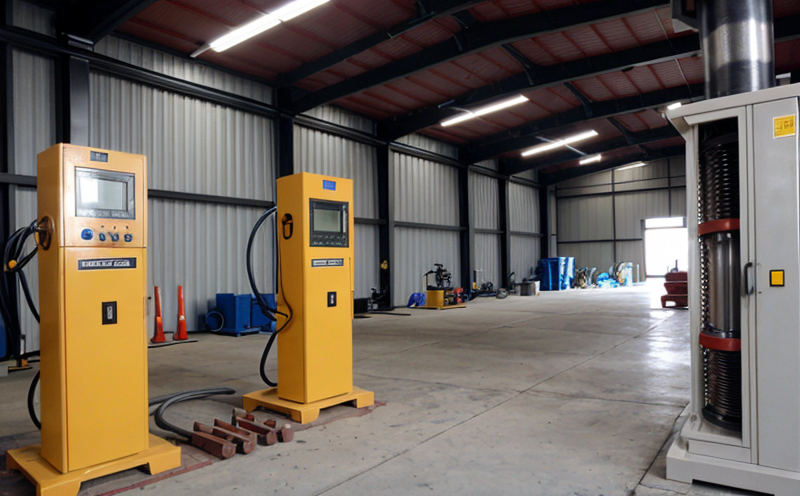ASTM D4727-12 Stack Load and Pallet Test
The ASTM D4727-12 stack load and pallet test is a critical procedure used to evaluate the mechanical strength of packaging materials, especially those intended for stacking and storage. This test ensures that packages can withstand the forces they encounter during distribution and storage without compromising their integrity or safety.
This service is particularly important in sectors where product integrity and compliance with international standards are paramount. For instance, in the food industry, proper packaging is essential to maintain hygiene and prevent contamination. In retail logistics, robust packaging ensures that products remain undamaged throughout transport and distribution.
The test measures how a stack of palletized packages behaves under controlled loading conditions. The primary objective is to determine if the packaging can withstand stacking pressures without collapsing or compromising its structural integrity. This procedure helps manufacturers and suppliers ensure their products meet regulatory requirements, improve product quality, and enhance customer satisfaction.
During the ASTM D4727-12 test, packages are placed on a pallet in the manner they would be stacked during storage and transportation. The loading is then gradually increased until failure occurs or a specified load limit is reached. The test results provide insights into the stacking capacity of the packaging, which is crucial for optimizing warehouse space and reducing material costs.
The ASTM D4727-12 stack load and pallet test aligns with broader quality assurance practices by ensuring that products meet industry standards such as ISO 9001 and EN 38. Compliance with these standards not only enhances a company's reputation but also reduces the risk of product recalls or damage during transit.
For R&D engineers, this service offers valuable data on material properties and structural design improvements. Quality managers can use the test results to monitor production processes and ensure consistency in packaging quality. Compliance officers benefit from this service by ensuring that packaging meets all regulatory requirements, thus avoiding potential legal issues.
The ASTM D4727-12 stack load and pallet test is a cornerstone of robust supply chain management, ensuring that products are protected during transportation and storage. This service supports sustainable practices by reducing waste and optimizing resource usage in the logistics sector.
Scope and Methodology
| Parameter | Description |
|---|---|
| Test Specimen | Palletized packages of varying weights, materials, and configurations. |
| Apparatus | A hydraulic or mechanical loading machine capable of applying controlled loads to the stack of palletized packages. |
| Load Application | The load is gradually increased until failure occurs or a specified limit is reached. The rate of load increase can vary depending on the package design and material properties. |
| Data Collection | Measures include peak load, deflection at maximum load, and any structural deformations observed during testing. |
| Acceptance Criteria | Packages must not collapse or lose their structural integrity under the applied loads. Compliance with ASTM D4727-12 standards ensures that packages meet industry expectations for stacking strength. |
| Reporting | A comprehensive report detailing test parameters, observed behaviors, and compliance status is provided to the client. |
The ASTM D4727-12 stack load and pallet test ensures that packaging materials are robust enough for stacking and transportation. This service aligns with broader industry standards such as ISO 9001, EN 38, and ASTM D6450, ensuring that clients meet regulatory requirements.
Customer Impact and Satisfaction
The ASTM D4727-12 stack load and pallet test significantly enhances customer satisfaction by ensuring product integrity and safety during distribution. By optimizing packaging design through this service, manufacturers can reduce the risk of damage to products in transit or storage.
This test is particularly beneficial for companies that rely heavily on logistics and supply chain management. By ensuring that packages meet stacking load requirements, companies minimize the risk of product loss due to structural failure. This leads to improved customer satisfaction, reduced waste, and enhanced brand reputation.
For quality managers, this service provides valuable data on packaging performance under controlled loading conditions. This information can be used to improve production processes and ensure consistent quality across different batches of products. Compliance officers benefit from the test results by ensuring that packaging meets all relevant regulatory requirements, thereby reducing legal risks associated with non-compliance.
The ASTM D4727-12 stack load and pallet test supports sustainable practices in the supply chain by optimizing resource usage and minimizing waste. By ensuring that packages are robust enough for stacking and transportation, companies can reduce material costs while enhancing product safety and quality.
Competitive Advantage and Market Impact
The ASTM D4727-12 stack load and pallet test provides a competitive edge by ensuring that packaging meets the highest industry standards. By optimizing package design through this service, companies can improve product integrity and safety during distribution.
This test is particularly beneficial for companies that rely heavily on logistics and supply chain management. By ensuring that packages meet stacking load requirements, companies minimize the risk of product loss due to structural failure. This leads to improved customer satisfaction, reduced waste, and enhanced brand reputation.
The ASTM D4727-12 stack load and pallet test supports sustainable practices in the supply chain by optimizing resource usage and minimizing waste. By ensuring that packages are robust enough for stacking and transportation, companies can reduce material costs while enhancing product safety and quality.
For R&D engineers, this service offers valuable data on material properties and structural design improvements. Compliance with ASTM D4727-12 standards ensures that packaging meets industry expectations for stacking strength, thereby improving the overall performance of products in the market.
The test results also provide insights into potential areas for product improvement, which can be used to enhance customer satisfaction and reduce costs associated with product damage during distribution. This service supports sustainable practices by optimizing resource usage and minimizing waste, leading to cost savings and improved efficiency in logistics operations.





